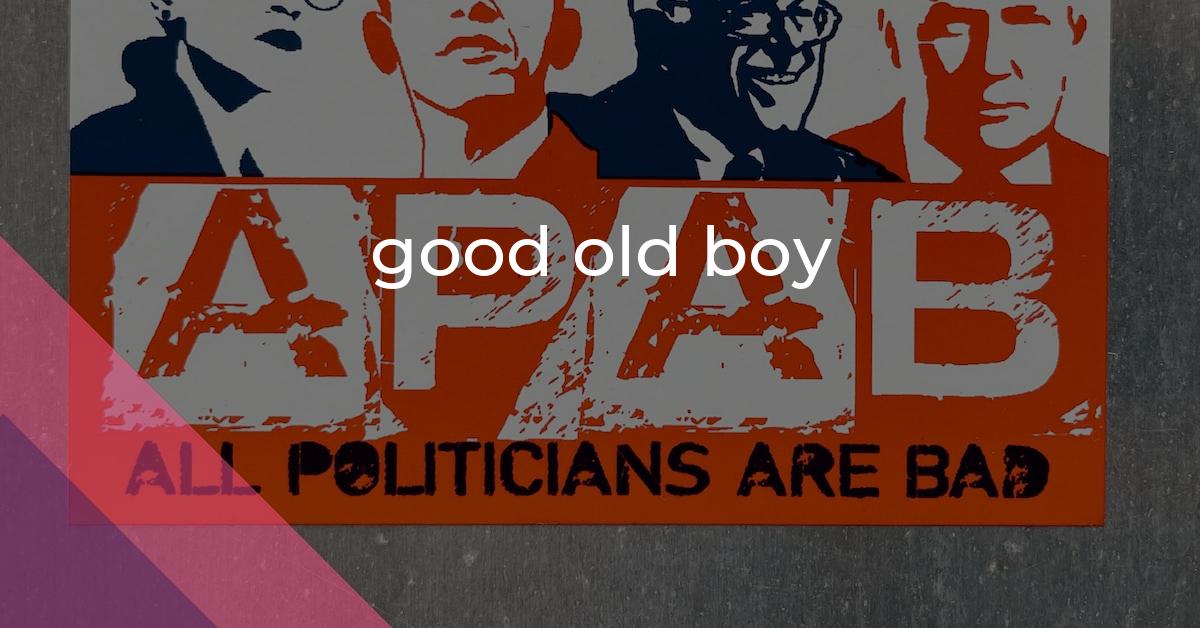good old boy: Idiom Meaning and Origin
What does ‘good old boy’ mean?
The idiom "good old boy" refers to a person, typically a man, who is seen as trustworthy, loyal, and part of a close-knit community or group. It often implies that this person follows traditional values and has influence or connections within that community.

Idiom Explorer
The idiom "Joe Citizen" refers to an average person, an ordinary individual who represents the typical member of society. It is often used to emphasize the relatability or universality of a situation or concept.
The idiom "inner circle" refers to a small, exclusive group of people who are closely connected and influential within a larger organization or social circle.
"Honest John" is an idiom that typically refers to a person who is trustworthy and honest in their actions and dealings.
The idiom "good graces" means being in someone's favor or approval. It implies having positive regard or being on good terms with someone.
A person who is trustworthy, helpful, or reliable. They are considered to be a "good egg" because they are good-hearted and can be counted on.
The idiom "good books" refers to being in a position of favor or under the protection of someone influential or powerful. It implies that the person is in a positive and secure state, likely due to their relationship with someone important.
The idiom "good old days" refers to a nostalgic longing for a past period of time that is remembered as better or more enjoyable than the present.
The idiom "friends in low places" means having associations with people who have a low social or moral standing. These may be individuals who are not respected or accepted by society due to their behavior, reputation, or background.
The idiom "friends in high places" means to have influential or powerful connections, typically in positions of authority or privilege. It suggests that having such connections can help one achieve favorable outcomes or access certain advantages.
Decoding Tradition
The idiom "good old boy" is a commonly used phrase in American English. It has its roots in the southern region of the United States, particularly in the states of Georgia, Alabama, and Mississippi. The term "good old boy" is used to refer to a person, typically a man, who is seen as trustworthy and loyal, often someone who is part of a close-knit community or social group.
The origins of the idiom can be traced back to the early 20th century, where it was primarily used to describe men who were part of the old-boy network in southern society. These networks were composed of privileged individuals who often had connections and influence in politics, business, and other influential spheres. The term "good old boy" was initially used as a positive descriptor for individuals who embodied the values and characteristics associated with this exclusive social group.
Over time, however, the meaning of the idiom has evolved and expanded. Today, the term "good old boy" is not limited to individuals who are part of elite networks but is often used to refer to any person who demonstrates characteristics such as loyalty, friendliness, and a willingness to help others. It has become a more general and colloquial expression, used to describe someone who is reliable, down-to-earth, and someone you can count on.
The idiom "good old boy" is deeply rooted in the cultural and social fabric of the southern United States, where community values and bonds are highly regarded. It reflects the importance of interpersonal relationships and the notion of belonging to a close-knit community. The term also carries connotations of tradition, with an emphasis on familiarity, trustworthiness, and adherence to shared values.
One interesting aspect of the idiom is its gender specificity. While it primarily refers to men, there is also a parallel version for women, known as "good old girl." This gendered distinction may reflect traditional gender roles and expectations prevalent in southern culture, where men are often perceived as the guardians of community values and women as nurturers and caretakers.
It is important to note that the idiom "good old boy" can sometimes carry negative connotations, particularly when it is associated with exclusionary practices and favoritism. In certain contexts, it can be used to describe individuals who use their connections and influence for personal gain or to maintain an unfair advantage. This negative aspect of the idiom highlights the potential for abuse and the need to question the integrity and fairness of certain social networks.
The idiom "good old boy" has a rich history and complex set of meanings. It originated as a term to describe individuals who were part of exclusive southern social networks but has since evolved into a more general expression to describe someone who is trustworthy, loyal, and reliable. However, the idiom's gender specificity and potential for negative connotations bring attention to the nuances and social dynamics at play. The idiom invites us to explore the complex relationships between tradition, community, and personal integrity.
The related idiom "big boy" is an expression used to describe someone who is powerful, influential, and often in a position of authority. Similar to the "good old boy" idiom, it emphasizes the idea of strength and reliability. The term "big boy" can be seen as a more assertive and confident version of the "good old boy," representing someone who is capable and has the ability to get things done.
On the other hand, the idiom "blue-eyed-boy-idiom-meaning-and-origin/">blue-eyed boy" carries a different connotation. It refers to someone who is favored or given preferential treatment, often due to their good looks, charm, or close relationship with someone in authority. This idiom highlights the potential for favoritism and bias in certain social contexts, suggesting that being a "blue-eyed boy" can result in unfair advantages and opportunities.
Lastly, the term "blue-eyed" by itself can also have various meanings. It can refer to someone with blue eyes, but it is often used figuratively to suggest innocence, purity, or trustworthiness. In this context, the idiom "blue-eyed" can be seen as a complementary descriptor to the "good old boy," highlighting the positive traits associated with the idiom, such as loyalty and reliability.
Example usage
Examples of how the idiom "good old boy" can be used in a sentence include:
1. "John is a true good old boy, always willing to lend a hand to his neighbors."
2. "Although he comes from a wealthy family, Mark has always had a down-to-earth attitude and is considered a good old boy by his friends."
3. "The local politicians are often perceived as a group of good old boys, making backroom deals instead of prioritizing the needs of the community."
More "Slang" idioms



